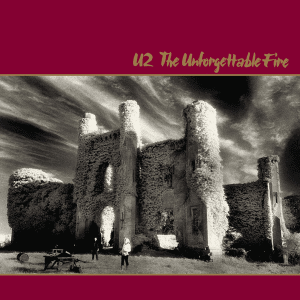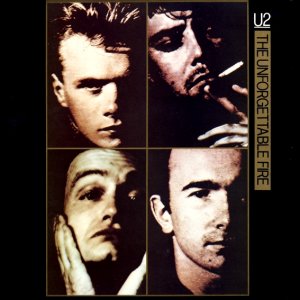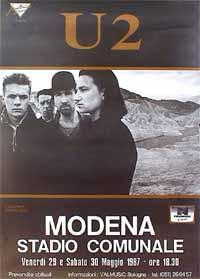Related Research Articles

U2 are an Irish rock band formed in Dublin in 1976. The group comprises Bono, the Edge, Adam Clayton, and Larry Mullen Jr.. Initially rooted in post-punk, U2's musical style has evolved throughout their career, yet has maintained an anthemic quality built on Bono's expressive vocals and the Edge's chiming, effects-based guitar sounds. Bono's lyrics, often embellished with spiritual imagery, focus on personal and sociopolitical themes. Popular for their live performances, the group have staged several elaborate tours over their career.

The Unforgettable Fire is the fourth studio album by Irish rock band U2. It was produced by Brian Eno and Daniel Lanois, and released on 1 October 1984 by Island Records. The band wanted to pursue a new musical direction following the harder-hitting rock of their previous album, War (1983). As a result, they employed Eno and Lanois to produce and assist in their experimentation with a more ambient sound. The resulting change in direction was at the time the band's most dramatic. The album's title is a reference to "The Unforgettable Fire", an art exhibit about the atomic bombing of Hiroshima.

Wide Awake in America is a four-track extended play by Irish rock band U2. It was released on 20 May 1985 through Island Records. It combines two live performances of songs from the group's 1984 album The Unforgettable Fire with two B-sides from the era, which had previously been available only in the United Kingdom. Wide Awake in America was originally released only in North America and Japan but it charted in the UK as an import. It was re-released internationally in 1990.

"Where the Streets Have No Name" is a song by Irish rock band U2. It is the opening track from their 1987 album The Joshua Tree and was released as the album's third single in August 1987. The song's hook is a repeating guitar arpeggio using a delay effect, played during the song's introduction and again at the end. Lead vocalist Bono wrote the lyrics in response to the notion that it is possible to identify a person's religion and income based on the street on which they lived, particularly in Belfast. During the band's difficulties recording the song, producer Brian Eno considered erasing the song's tapes to have them start from scratch.

"I Will Follow" is a song by rock band U2. It is the opening track from their debut album, Boy, and it was released as the album's second single in October 1980. Lead singer Bono wrote the lyrics to "I Will Follow" in tribute to his mother Iris Hewson, who died when he was 14 years old.

"Desire" is a song by Irish rock band U2 and the third track on their 1988 album, Rattle and Hum. It was released as the album's lead single on 19 September 1988, and became the band's first number-one single in Australia and on the United Kingdom Singles Chart. It reached number three on the Billboard Hot 100 in the United States, and topped both the Modern Rock Tracks and Mainstream Rock Tracks charts, making it the first song to reach number one on both charts simultaneously. It reached number two on the Dutch Top 40. At the 31st Annual Grammy Awards, "Desire" won the 1989 Grammy Award for Best Rock Performance by a Duo or Group with Vocal.

"The Unforgettable Fire" is a song by Irish rock band U2. It is the title track of their fourth album (1984), and was released as the album's second single in April 1985. The band cited an art exhibition by victims of the atomic bombings of Hiroshima and Nagasaki that was held at The Peace Museum in Chicago as the lyrical inspiration for the song. It became U2's first number one single in Ireland, their third top-ten hit in the United Kingdom, reaching number six on the UK Singles Chart, and reached number eight on the Dutch singles chart.

"Pride (In the Name of Love)" is a song by Irish rock band U2. It is the second track on the band's 1984 album, The Unforgettable Fire, and was released as its lead single in September 1984. The song was produced by Brian Eno and Daniel Lanois. Written about the American civil rights leader Martin Luther King Jr., "Pride" received mixed critical reviews at the time, but it was a major commercial success for U2 and has since become one of their most popular songs, as well as being re-evaluated positively by many as one of the greatest songs of all time. It appeared on the band's compilation albums The Best of 1980–1990 and U218 Singles and was reworked and re-recorded for Songs of Surrender (2023).

"40", also known as "40 (How Long)", is a song by Irish rock band U2. It is the tenth and final track on their 1983 album, War. The song is noted for its live performances; guitarist the Edge and bassist Adam Clayton trade instruments during performances of it, and as it was commonly played to end their concerts, the band would leave the stage one-by-one as the audience continued to sing the refrain "How long to sing this song?". The lyrics are a modification of the Bible's Psalm 40.

"Two Hearts Beat as One" is a song by Irish rock band U2. It is the seventh track on their 1983 album, War, and was released as its second single in the United States, United Kingdom, and Australia on 21 March 1983.

"11 O'Clock Tick Tock" is a song by Irish rock band U2. It was released as a single on 16 May 1980, and was produced by Martin Hannett. It followed their debut EP Three and the single "Another Day." It was the group's first release for Island Records. The song's lyrics were written by lead vocalist Bono based on his experience at a Cramps concert in London, where he watched a "lifeless, goth-style" crowd from the balcony.

The Joshua Tree Tour was a concert tour by Irish rock band U2. Staged in support of their 1987 album The Joshua Tree, it comprised 109 shows over three legs, spanning from April to December that year. The first and third legs visited North America, while the second leg toured Europe. Although it featured minimal production like the group's previous tours, the Joshua Tree Tour was the first to involve larger venues in arenas and stadiums as a result of the album's breakthrough. Much like U2 did on The Joshua Tree, on tour the group explored social and political concerns, along with American roots and mythology, collaborated with American guest musicians and opening acts such as B. B. King. U2 also recorded new material; these songs and their experiences on tour were depicted on the 1988 album and documentary film Rattle and Hum and on the 2007 video and live album Live from Paris. Territories that this tour missed would later be covered by Rattle and Hum's Lovetown Tour.

The Unforgettable Fire Tour was a concert tour by Irish rock band U2 that took place in 1984 and 1985 in support of band's album The Unforgettable Fire. Beginning in August 1984 with the band's first tour to Australia and New Zealand, the tour spanned four further legs which included 43 concerts in Europe and 50 in North America.

The War Tour was a concert tour by the Irish rock band U2, which took place in 1982 and 1983 in support of the group's third album War. The tour took place in Western Europe, the United States, Canada and Japan, with new material from War taking an increasing role as the tour progressed. Venues were mostly halls, but some arenas were introduced later on. U2's performances were very well received both critically and commercially, especially in the United States where U2 broke through to become a major act. Scenes of lead singer Bono waving a white flag during the song "Sunday Bloody Sunday" became an emblematic image of this phase of U2's career. It was their first tour as full-time headlining act and their first to be profitable.
"The Electric Co." or "Cry/The Electric Co." is a song by Irish rock band U2, and is the tenth track on their debut album Boy, released in 1980.
"In a Little While" is a song by Irish rock band U2 and the sixth track on their 10th studio album, All That You Can't Leave Behind (2000). Although it was not released as a single from the album, it became a hit on adult album alternative radio in the United States, reaching number one on the Billboard Triple-A chart for a single week in March 2002.
"A Sort of Homecoming" is a song by Irish rock band U2, and is the opening track on their 1984 album, The Unforgettable Fire. A live version of the track is found on 1985's four-track EP, Wide Awake in America.

"Sunday Bloody Sunday" is a song by Irish rock band U2. It is the opening track from their 1983 album War and was released as the album's third single on 21 March 1983 in the Netherlands and West Germany. "Sunday Bloody Sunday" is noted for its militaristic drumbeat, harsh guitar, and melodic harmonies. One of U2's most overtly political songs, its lyrics describe the horror felt by an observer of the Troubles in Northern Ireland, mainly focusing on the 1972 Bloody Sunday incident in Derry where British troops shot and killed unarmed civil rights protesters. Along with "New Year's Day", the song helped U2 reach a wider listening audience. It was generally well received by critics on the album's release.
This is a timeline of the history of rock band U2:

"One Tree Hill" is a song by Irish rock band U2 and the ninth track on their 1987 album The Joshua Tree. In March 1988, it was released as the fourth single from the album in New Zealand and Australia, while "In God's Country" was released as the fourth single in North America. "One Tree Hill" charted at number one on the New Zealand Singles Chart and was the country's second-most-successful hit of 1988.
References
Footnotes
- ↑ "TourDB statistics – U2 on tour". u2gigs.com. Retrieved 2015-07-08.
- ↑ McGee (2008), p. 86
- 1 2 "U2 – Mainstream Rock Airplay". Billboard . Retrieved 27 February 2023.
- ↑ Stokes (1996), p. 58
- 1 2 McCormick (2006), p. 151
- ↑ Graham, Bill; van Oosten de Boer, Caroline (2004). U2: The Complete Guide to their Music. London: Omnibus Press. p. 25. ISBN 0-7119-9886-8.
- ↑ "Bono and Adam on Rockline (2 parts)". U2Interview.com. Retrieved 11 June 2020.
- ↑ "U2MoL – Unforgettable Fire – Bad". Muorji.se. Retrieved 2012-01-09.
- ↑ "U2 – Bad / In The Garden / Walk On The Wild Side / 40 – Pittsburgh – July 26, 2011 (Heinz Field)". YouTube. Archived from the original on 2021-12-21. Retrieved 2012-01-09.
- ↑ "U2 Setlist – Pittsburgh – Jul 26, 2011". U2tours.com. Archived from the original on 2012-03-25. Retrieved 2012-01-09.
- 1 2 de la Parra (1994), pp. 52–56
- ↑ Henke, James (18 July 1985). "''Wide Awake in America'' Album Review". Rolling Stone . No. 452/453.
- ↑ "U2 Bad – U2 on tour". U2gigs.com. Archived from the original on 6 October 2009. Retrieved 25 August 2009.
- ↑ Live Aid: A Look Back At A Concert That Actually Changed The World MTV.com. Retrieved 31 October 2006.
- ↑ Edwards, Gavin (10 July 2014). "U2's 'Bad' Break: 12 Minutes at Live Aid That Made the Band's Career". Rolling Stone. Retrieved 16 January 2015.
- ↑ U2-Vertigo-Tour.com, 1985-07-13, London set list, accessed 20 March 2008; McCormick, Neil (ed), (2006). U2 by U2. HarperCollins Publishers, pages 162, ISBN 0-00-719668-7.
- ↑ Parra (2003), pp. 72–73
- ↑ Bono on Bono
- ↑ U2, the Only Band that Mattered in the '80s? Archived 2007-02-21 at the Wayback Machine about.com. Retrieved 31 January 2007
Bibliography
- de la Parra, Pimm Jal (2003). U2 Live: A Concert Documentary (Updated ed.). London: Omnibus Press. ISBN 978-0-7119-9198-9.
- McGee, Matt (2008). U2: A Diary. London: Omnibus Press. ISBN 978-1-84772-108-2.
- U2 (2006). McCormick, Neil (ed.). U2 by U2 . London: HarperCollins. ISBN 978-0-00-719668-5.
{{cite book}}: CS1 maint: numeric names: authors list (link)